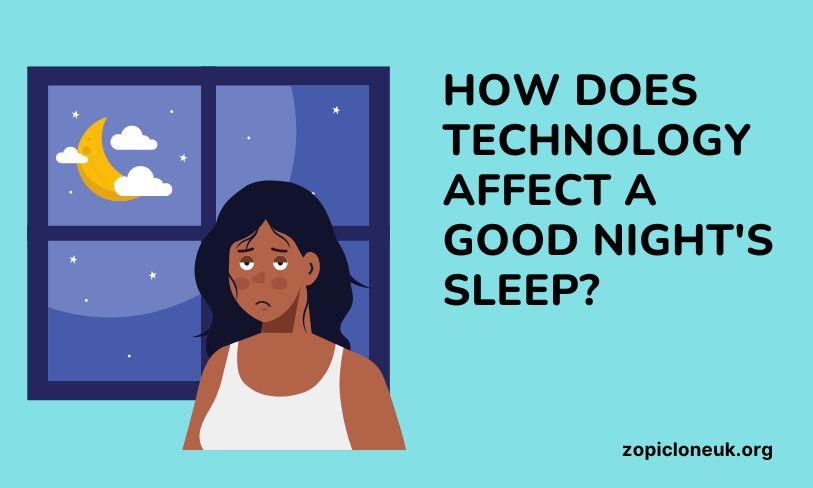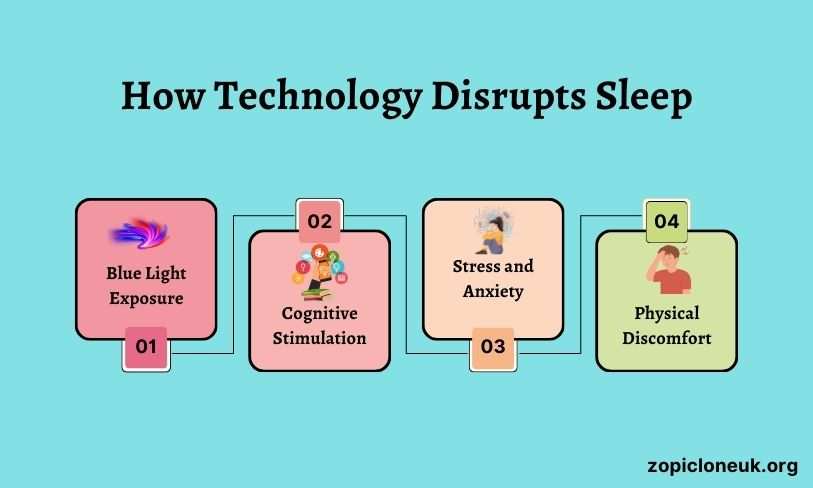
How Does Technology Affect A Good Night’s Sleep:- In today’s digital age, technology has seamlessly integrated into almost every aspect of our lives. From smartphones and tablets to laptops and smartwatches, our daily routines revolve around these gadgets. However, as technology becomes increasingly pervasive, concerns about its impact on our health, particularly sleep, have also grown. This blog will explore how technology affects a good night’s sleep, delving into the mechanisms, consequences, and potential solutions for mitigating its adverse effects.
Contents
The Science of Sleep
Sleep is a complex and vital process governed by various biological mechanisms. The primary regulator of sleep is the circadian rhythm, a natural, internal process that repeats roughly every 24 hours. This rhythm is influenced by external cues, most notably light. Exposure to light helps regulate the production of melatonin, a hormone that promotes sleep. During the day, light suppresses melatonin production, keeping us awake and alert. As evening approaches and light diminishes, melatonin levels rise, preparing our bodies for sleep.
How Technology Disrupts Sleep

Blue Light Exposure
One of the most significant ways technology disrupts sleep is through blue light exposure. Electronic devices such as smartphones, tablets, and computers emit blue light, which has been shown to interfere with melatonin production. Prolonged exposure to blue light, especially in the evening, can delay the onset of sleep, reduce sleep quality, and make it harder to wake up in the morning.
Cognitive Stimulation
Engaging with technology before bed can also lead to cognitive stimulation, making it harder to relax and fall asleep. Activities like browsing social media, playing video games, or watching exciting TV shows can increase mental alertness and delay the transition to a restful state.
Stress and Anxiety
The content we consume on digital platforms can also contribute to stress and anxiety. Constantly checking emails, reading news, or engaging in online arguments can elevate stress levels, making it difficult to unwind and achieve a peaceful night’s sleep.
Physical Discomfort
Using electronic devices in bed often leads to poor posture, which can result in physical discomfort and pain. Holding a smartphone or tablet for extended periods can strain the neck and back, disrupting sleep and leading to long-term musculoskeletal issues.
The Consequences of Poor Sleep
Cognitive Impairment
Lack of sleep can impair cognitive functions such as memory, attention, and decision-making. This can affect daily performance at work or school and increase the risk of accidents and injuries.
Mood Disturbances
Chronic sleep deprivation is linked to mood disorders like depression and anxiety. It can also exacerbate existing mental health conditions, leading to a vicious cycle of poor sleep and deteriorating mental health.
Physical Health Issues
Long-term sleep deprivation is associated with numerous health problems, including obesity, diabetes, cardiovascular disease, and weakened immune function. It also increases the risk of chronic conditions and can shorten lifespan.
Mitigating the Effects of Technology on Sleep
Implementing a Tech-Free Bedtime Routine
Creating a tech-free bedtime routine can significantly improve sleep quality. Establishing a consistent sleep schedule, engaging in relaxing activities like reading a book or taking a warm bath, and keeping electronic devices out of the bedroom can help signal to your body that it’s time to wind down and prepare for sleep.
Using Blue Light Filters
Many electronic devices now come with blue light filters or “night mode” settings that reduce blue light emission. Using these features in the evening can help minimize the impact of blue light on melatonin production and sleep quality.
Setting Boundaries with Technology
Setting boundaries with technology use, such as limiting screen time before bed and designating tech-free zones in the home, can help reduce cognitive stimulation and stress. Practicing mindfulness and other relaxation techniques can also be beneficial.
Ergonomic Adjustments
Making ergonomic adjustments to how you use technology can help prevent physical discomfort. This includes using stands for devices to maintain a neutral posture and ensuring that screens are at eye level.
FAQs
How does blue light from screens affect sleep?
Blue light from screens can interfere with the production of melatonin, a hormone that regulates sleep, making it harder to fall asleep and reducing sleep quality.
What are some tips for reducing the impact of technology on sleep?
Implementing a tech-free bedtime routine, using blue light filters, setting boundaries with technology use, and making ergonomic adjustments can help reduce the impact of technology on sleep.
Can using technology before bed cause stress and anxiety?
Yes, engaging with technology before bed can increase stress and anxiety levels, making it harder to relax and fall asleep.
How can I create a tech-free bedtime routine?
Establish a consistent sleep schedule, engage in relaxing activities like reading or taking a warm bath, and keep electronic devices out of the bedroom to create a tech-free bedtime routine.
Are there any long-term health consequences of poor sleep?
Yes, long-term sleep deprivation is linked to cognitive impairment, mood disturbances, and physical health issues such as obesity, diabetes, cardiovascular disease, and weakened immune function.
Is it possible to use technology in a way that doesn’t disrupt sleep?
Yes, using blue light filters, setting boundaries with technology use, and practicing mindfulness and relaxation techniques can help mitigate the impact of technology on sleep.
Conclusion
In conclusion, while technology offers numerous benefits and conveniences, its impact on sleep cannot be overlooked. Blue light exposure, cognitive stimulation, stress, and physical discomfort are all ways that technology can disrupt a good night’s sleep. However, by implementing tech-free routines, using blue light filters, setting boundaries with technology, and making ergonomic adjustments, we can mitigate these effects and improve our sleep quality. Prioritizing sleep is essential for overall health and well-being, and being mindful of how technology affects our sleep is a crucial step in achieving restful nights.
Author Details




Medical content by qualified psychiatrists
Our editorial policy

Zopiclone precautions Read our potential abuse notice

Looking for a seller? Locate the best Zopiclone vendor






